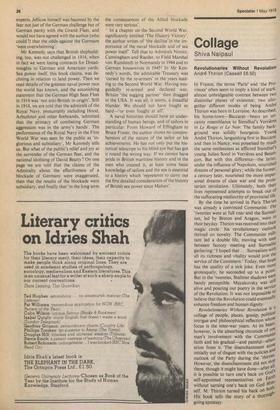Collage
Shiva Naipaul
Revolutionaries Without Revolution Andre Thirion (Cassell £6.50)
In France, the terms 'Paris' and 'the Provinces' often seem to imply a kind of stark, almost unbridgeable contrast between two dissimilar planes of existence; two alto: gether different modes of being. Andre Thirion was born in Lorraine. As described. his home-town—Baccarat—bears an uncanny resemblance to Stendhal's Verrieres in Le Rouge et Le Noir. The family background was solidly bourgeois. Young Andre Thirion, languishing first in Baccarat and then in Nancy, was possessed by much the same restlessness as afflicted Stendhal's young Julien Sorel in Verrieres and Besancon. But with this difference—the latter. under the influence of Napoleon, nourished dreams of personal glory; while the former, a century later, nourished the more imPer' sonal dreams of class war and the prole' tarian revolution. Ultimately, both their lives represented attempts to break out of the suffocating mediocrity of provincial life.
By the time he arrived in Paris Thir■on was already a convinced Communist. fhe 'twenties were at full roai and the Surrealists, led by Breton and Aragon, were 1.0 their heyday. Thirion was received into their magic circle: his revolutionary outlook thrived on novelty. The Communist milltant led a double life, moving with ease between factory meeting and Surrealist gathering: 'I hoped that ... Surrealism voth all its richness and vitality would join the service of the Comintern.' Today, that hoPe has the quality of a sick joke. Even more grotesquely, he succeeded up to a Poot' But in the 'twenties, Stalinist shadows were. , barely perceptible. Mayakovsky was still alive and pouring out poetry in the service of the Revolution. It was not impossible to believe that the Revolution could eventuallY enhance freedom and human dignity.
Revolutionaries Without Revolution Is collage of people, places, gossip, politic intrigue and philosophical reflection whose
focus is the inter-war years. At its heart' however, is the absorbing chronicle of iret man's involvement with the Commurus faith and his gradual—and painful—allenation from it. The disenchantment arose,
initially out of disgust with the policies outlook of the Party during the 'thirties: However, the disenchantment did not sto•P there, though it might have done—after
it is possible to turn one's back on God.h self-appointed representatives on Ea,ft without turning one's back on God Hull, self. M. Thirion turned his back on WT., His book tells the story of a thorottgli going apostasy.


































 Previous page
Previous page